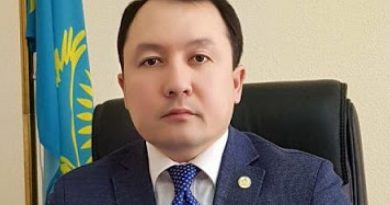Anti-corruption and conflict of interest
The Kazakh authorities are considering a legislative restriction for public servants to open and have accounts in foreign banks located outside the country. This was announced by Prime Minister Askar Mamin in his response to the deputy’s request.
On May 24, six deputies of the party “Ak Zhol” at the lower house of the parliament of Kazakhstan sent a deputy request to the country’s Prime Minister Askar Mamin. The subject of the request is “On toughening the punishment for corruption violations”.
“Corruption is the main problem of modern Kazakhstan. It undermines the economy, demotivates business, causes a widening gap between rich and poor, and leads to social tension in society. In almost every product and every service today there is a so-called “corruption rent” – the share of “kickbacks” and bribes, which leads to an unreasonable increase in prices for which the population pays,” the request of the deputies says.
In their appeal, lawmakers also recall that, according to Global Financial Integrity, more than $167 billion was illegally withdrawn from Kazakhstan to offshore.
“In other words, corrupt officials stole twice as much money from the country as Kazakhstan accumulated in the National Fund from the sale of oil for all the years of its independence. That’s why, despite the GDP indicators close to Eastern Europe, the lives of ordinary Kazakh people cannot be called “European”, because the lion’s share of GDP is plundered and does not affect the standard of living within the country,” the deputies emphasize.
At the same time, they note that, along with the return of money stolen from the people, the urgent issue remains the suppression of the ongoing withdrawal of illegal capital abroad.
“In this regard, the formation of a certain behavior of people prone to such crimes, even at high risk of exposure, is very typical. Their cynical logic is to have time to hide stolen funds abroad. And even after being convicted, they expect to leave in a year or one and a half year on conditional early discharge and quietly leave for their capitals, which could never earn by honest labor. This motivation was first disclosed in the West, in connection with which, for example, in a number of US states, persons sentenced for corruption, along with their sentences of 10-15 years, are prohibited from applying early release. A similar norm has recently been introduced in Belarus and the same draft law has been submitted to the State Duma of the Russian Federation. And only in Kazakhstan, despite the gigantic sums of misappropriation and extortion (and maybe because of them), people, who seem to be loudly convicted for long periods, are released without any noise as soon as possible, which the Kazakh people learn post factum with surprise from the media. There is no doubt that many of them are safely leaving to the reserved “stash”, which will more than be enough for a chic life in more comfortable countries,” the deputies are indignant.
In this regard, they suggested, it is necessary not to allow parole of persons convicted of corruption, to prohibit convicted corrupt officials, even after serving their sentence, to leave the country until the full payment of stolen funds and to abolish the principle of bank secrecy for high-level public servants’ foreign accounts (including government members), Heads of national companies and their affiliates.
Two months later, the Prime Minister and Attorney General of Kazakhstan Gizat Nurdauletov considered the proposals of the deputies. The responses of the Prime Minister and the Prosecutor General clearly show a conflict.
“Given the legislative requirement for full compensation, as well as taking into account the possibility for the convicted person to make amends for the damage, the majority of authorized state bodies express the opinion that it is premature to consider at this stage the establishment of a ban on the use of parole for corruption offenses,” Prime Minister says in the official reply. “At the same time, the Prosecutor General’s Office considers it possible to examine the advisability of restricting the use of parole only in relation to persons who have committed particularly serious corruption crimes.”
As for the ban on leaving the country until the full recovery of stolen funds, according to the Prime Minister, such a norm in Kazakh legislation already exists:
“As part of the enforcement proceedings, measures are envisaged in the form of a ban on traveling to foreign countries by including the debtor in a single register – a unified electronic data bank posted on the official Internet resource of the Ministry of Justice. In addition, according to the requirements of the penal law, convicts are obliged not to leave the territory of the Republic of Kazakhstan until they have completed their basic punishment or were released from punishment, the probationary monitoring has expired and the sentence has been postponed,” the Head of the cabinet said in his reply.
On the third point – regarding the abolition of the principle of bank secrecy for foreign accounts of high-ranking civil servants – the Prime Minister expressed solidarity to the deputies.
“In order to prevent the concealment of assets and capital by officials of state bodies, the issue is being considered of legislatively introducing restrictions on persons holding a responsible public position, as well as persons authorized to perform public functions, on opening and having accounts (deposits) in foreign banks located outside the Republic of Kazakhstan. Corresponding legislative amendments are being worked out as part of the current legislative activity,” Askar Mamin said.
However, Gizat Nurdauletov, the Head of the Supervisory authority, was more than careful in his answer to the third paragraph:
“The issue of canceling the principle of bank secrecy for foreign accounts of high-ranking civil servants (including government members), Heads of national companies and their affiliates should be considered with practicality and taking into account the requirements of the Article 18 of the Constitution of Kazakhstan,” the Prosecutor General responded to the third proposal of the deputies.
And this is a very remarkable reference to the Constitution of the country. The fact is that it says the following:
“Everyone has the right to privacy, personal and family secrets, protection of his honor and dignity. Everyone has the right to secrecy of personal deposits and savings, correspondence, telephone conversations, postal, telegraphic and other messages. Limitations of this right are allowed only in cases and in the manner directly established by the Law.”




